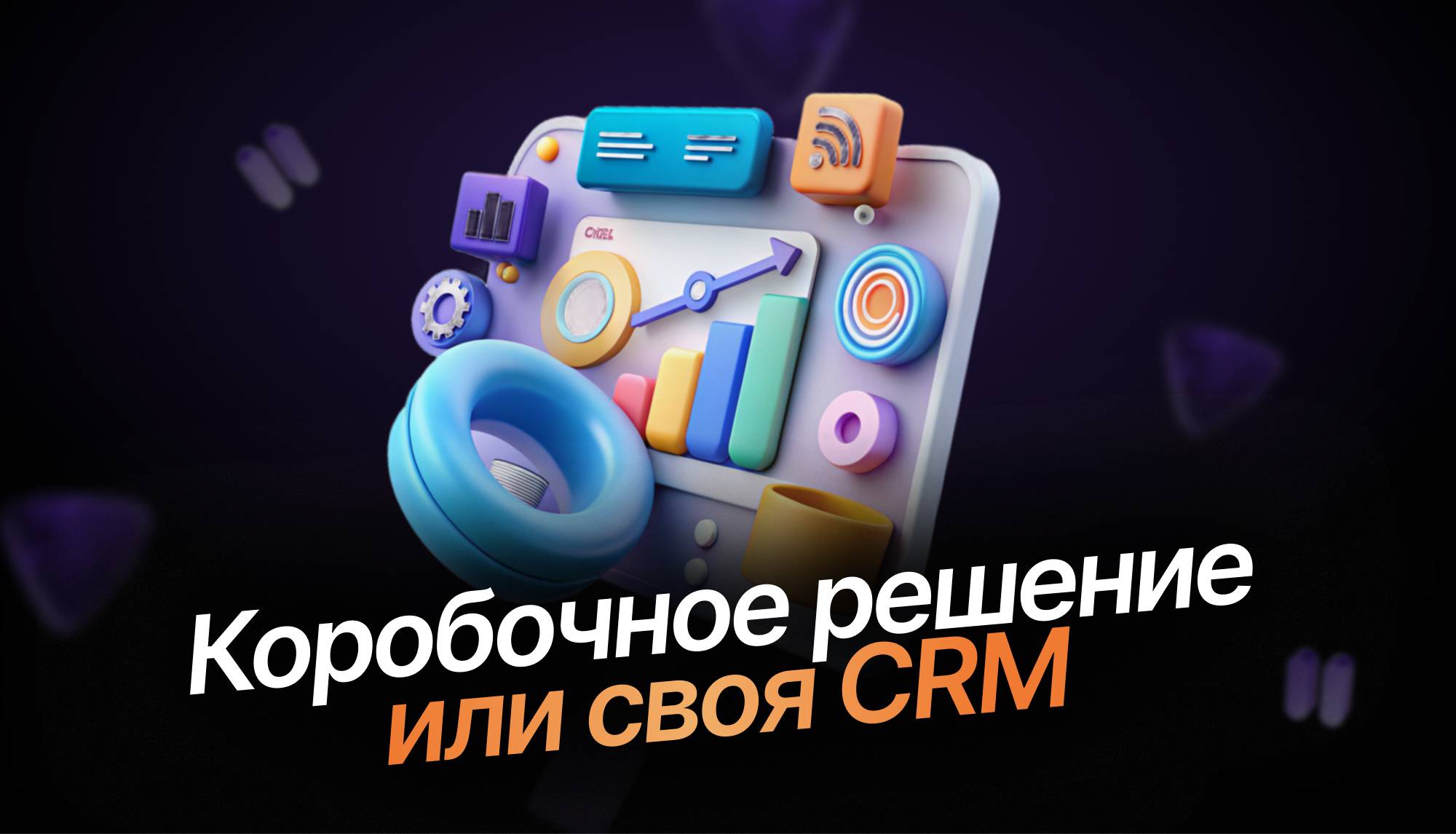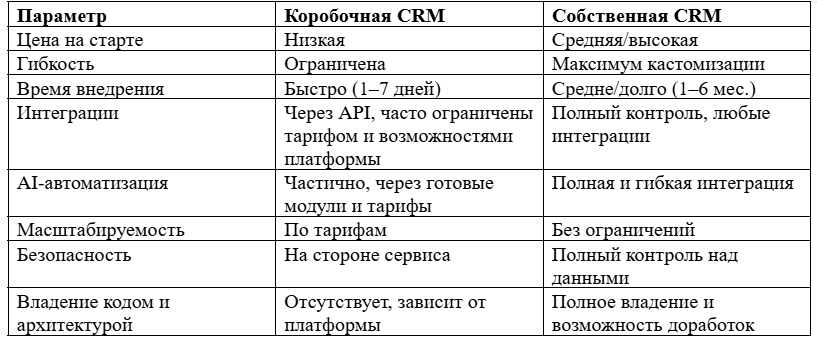Own CRM vs boxed solutions: what should a business choose?

CRM (Customer Relationship Management) is a customer relationship management system that helps businesses streamline sales, marketing, process requests, and build loyalty. CRM systems have become a must-have element for businesses that interact with customers, from online stores to IT companies and service centers.
A business owner may have a question: use a ready-made boxed solution or invest in developing their own CRM? Boxed systems like Bitrix24, amoCRM, HubSpot, or Zoho offer a quick start and a set of standard out-of-the-box features. But as the company grows, such decisions become constrained: it becomes difficult to embed your own logic, API restrictions hinder integrations, and implementing AI solutions becomes an expensive and inflexible process.
With the rapid increase in interest in automation, no-code tools like n8n, and GPT-based AI bots, more and more companies are thinking about developing their own CRM. Such a system allows you to build processes for specific business tasks, be flexible and control the architecture, data and product development. This is especially true for automation agencies, IT directors, and those who work at the interface between AI and business.
In this article, we'll look at the difference between boxed and in-house CRMs, when to choose each option, and why for many companies, investing in custom development can pay off faster than you think.
In-box CRM: advantages and limitations
Boxed CRM systems are ready-made software solutions that can be quickly implemented into a business without having to develop a product from scratch. Among the most popular ones are Bitrix24, amoCRM, HubSpot, Zoho, etc. These platforms offer universal functionality suitable for most common tasks: managing deals, managing contacts, setting up sales funnels, integrating with telephony and messengers.
There are two main advantages of boxed CRMs. The first is a quick start, as implementation takes from a few hours to a couple of days. The second plus is support and updates. All technical issues, bugs and updates are solved by the vendor. The user gets access to new features and improvements without additional development costs.
Boxed solutions also have limitations:
- Conditional flexibility. Many systems do not allow deep customization of business logic, interface, or automation. If the company's process differs from the standard one, it is difficult to implement it in a box without crutches.
- Imposed functionality. Along with the right tools, the user also has to use those that are not needed, but are not disabled. This can overload the interface and make it more difficult to work with.
- Vendor dependency. All logic, data, and integrations are under the control of the CRM developer. When it is necessary to migrate to another platform, businesses face difficulties: limited exports, lack of access to the code, and connection to tariffs and API limits.
Boxed CRM is a good choice at the start when you need to get started quickly and there is no need for deep customization. But with the development of a business, standard functionality ceases to meet your needs — and then you come up with the idea of creating your own CRM adapted to its processes.
When is it profitable to develop your own CRM?
Your own CRM is not just an alternative to a boxed solution, but a tool that fully adapts to business needs. Developing from scratch may require more time and resources, but in the long run it gives the most return, especially if the company has unique processes, the need for deep automation, or an active robot with AI solutions.
Here are the key reasons why you should develop your own CRM:
- Flexibility for specific processes. Only what is really needed is created: an interface, logic, modules. There is no redundant functionality typical for boxed systems.
- Full control over data. CRM is deployed on a business server or in the cloud under its management. There is an accurate understanding of where and how customer data is stored.
- Safety and compliance. You can set up any access, encryption, and compliance policies, including local and international regulations.
- Knowledge of architecture and code. There is no dependence on a third-party vendor. The team can independently develop the product, implement improvements and adapt to new tasks.
- Integration with AI tools. Our own system can be easily connected to GPT bots, recommendation systems, classifiers, and voice assistants without tariff restrictions or APIs.
- Scaling without restrictions. You don't have to run into subscription limits. The system grows with business without requiring a transition to more expensive tariffs.
If a company uses a data-driven approach, actively implements AI and automation, or works in a specific niche, its own CRM is an investment in efficiency, security and flexibility.
Comparison table: boxed vs in-house CRM
For a better understanding of the key differences between boxed CRM systems and in-house developments, a table comparing the main parameters is provided below. It helps you assess the advantages and limitations of each approach and choose the best solution depending on your business needs.

Integrating your own CRM with an AI bot
Integrating an AI bot with your own CRM opens up new opportunities for automating key business processes. It allows you to process incoming requests, orders, technical support requests and customer requests in real time without the involvement of a manager. In particular, such bots can perform initial lead qualification, clarify needs, collect the necessary data and immediately create a customer card in CRM.
This significantly reduces the workload on the team, speeds up the processing of requests and improves the user experience. Automating the initial contact helps you avoid losing potential customers, especially during peak hours when managers are overloaded or unavailable.
With your own CRM, all these processes can be implemented as flexibly as possible: customize the logic of interaction, adapt communication scenarios to a niche, use data from internal systems and store correspondence in the right format. Unlike boxed solutions, our own system gives full control over the architecture and API, which makes it easy to implement AI bots, scale their functionality and adapt to increased workloads.
Integrating your own CRM with AI bot and no-code automation via n8n
Our own CRM in conjunction with AI bots and the n8n no-code platform gives businesses almost unlimited automation opportunities. Such integrations make it possible to solve routine tasks, speed up customer processing and build intelligent scenarios based on GPT models.
What can be automated using an AI bot:
- lead qualification by chat or voice — the bot can ask clarifying questions and determine whether the client meets the criteria;
- answers to frequently asked questions based on a knowledge base, which reduces support load;
- filling out a customer card in CRM after a dialogue with extracting the necessary data from messages;
- linking the dialogue to an existing deal or a created ticket;
- automatic reminders, follow-up messages, offers based on previous customer actions.
For more efficient automation, a combination of three key components is used. The CRM+n8n+GPT combination works as a full-fledged automation center without programmers:
- n8n is a no-code scripting tool: sending emails, processing forms, interacting with messengers, API and CRM;
- GPT-4 — used to generate responses, process requests, classify, extract data from text;
- CRM is the central storage point for data, events, and connections between entities (leads, customers, deals).
Let's consider several practical scenarios for using this bundle:
- The manager enters new information — GPT categorizes the request — n8n adds it to CRM with an appropriate note.
- A new message comes to Telegram — n8n sends it to GPT — a structured response is generated — a record is created in CRM.
- After the deal is closed — GPT generates a letter of thanks and a request for feedback — the letter is sent to the client via e-mail or messenger.
Such scenarios are almost impossible to implement in boxed CRMs without additional subscriptions, technical API restrictions, or cumbersome workarounds. Everything in our own CRM+n8n works transparently, flexibly and under full business control.
When should you develop your own CRM, and when is it better to choose a box?
A boxed solution is the best choice for small businesses and startups that need to launch quickly and minimize technical infrastructure costs. If the company does not have internal resources for support and development, and business processes fit into the standard logic of funnels and tasks, the box allows you to get started in just a day. This solution is well suited in situations where system flexibility is not a critical factor, and automation is reduced to basic scenarios.
Developing your own CRM is relevant when a company has unique processes that are difficult or impossible to implement within the standard interface and logic of boxed systems. Our own CRM is especially relevant for teams working with AI tools that require flexible integration and deep control over data. When it is necessary to build custom automation using chatbots, GPT models and no-code platforms, boxed solutions quickly run into restrictions on APIs, scenarios, and tariffs.
In addition, an in-house CRM is becoming a strategic advantage for companies that plan to scale. When the load increases, new data sources appear and you need to combine them into a single system, the “tailor-made” architecture allows you to develop the product without restrictions and dependence on an external vendor.
findings
Ready-made out-of-the-box CRM systems give businesses the opportunity to get started quickly and immediately use the basic set of features for managing customers and deals. This is a convenient option for those who value the speed of implementation and minimal initial costs.
But such solutions are often limited in terms of flexibility and automation options. Standard processes and interfaces are not always suitable for the company's unique tasks, and API and tariff restrictions make it difficult to integrate modern technologies, especially AI bots and intelligent scenarios.
Developing your own CRM is an investment in long-term business growth and scaling. Our own system allows you to create individual processes, freely integrate AI tools and no-code automation, and ensure a high level of data control and security. For companies striving for innovation and effective automation, their own CRM is becoming a key competitive advantage.

